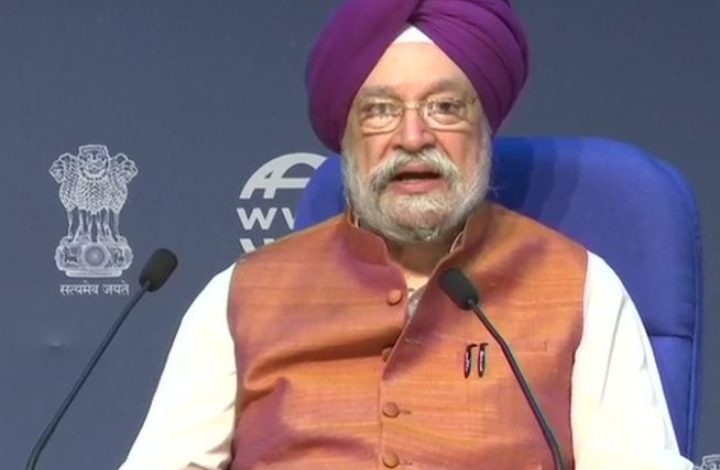Global Economy Needs Clean, Affordable, Reliable And Sustainable Energy To Speed Up Post-Pandemic Recovery : Hardeep Singh Puri
If prices are not brought under control, global economic recovery could be fragile: says the minister

Minister of Petroleum & Natural Gas and Housing &Urban Affairs Shri Hardeep Singh Puri today said that India believes that access to energy must be affordable and reliable. In his welcome remarks at Fifth India Energy Forum by CERAWeek at New Delhi, he said that the global economy needs Clean, Affordable, Reliable, Sustainable energy to speed up the post-pandemic recovery. We need to accept that the world needs a reliable supply of oil and gas until we can build new energy infrastructure.
The Minister said that to say that the world faces unprecedented challenges would be an understatement. In an era of energy transition, the energy markets are characterised by key imbalances, he added.
Shri Puri said that the current levels of oil and gas prices are too high. India is 85% dependent on imported oil while the import dependence is about 55% for gas. He said that 20% of the country’s import bill is from these items. The import bill of these items has almost gone up by almost three times in last quarter compared to last year’s corresponding quarter. He said that the extreme volatility and high prices have led to surge in the domestic prices of hydrocarbon fuels. The high prices of Oil has impact on the economies, leading to surge in inflation and affecting the logistics cost. Describing the situation as the wakeup call, Shri Puri said that if prices are not brought under control, global economic recovery could be fragile. He underlined that prices have to be predictable, dependable and stable. This may also impact the producers in the long run, he added.Shri Puri said that OPEC+ countries should factor in the sentiments of the consuming countries.
Shri Puri said that India is accelerating its efforts to become gas-based economy. He said that about $60 billion investment is underway in the country in setting up the infrastructure- pipelines, terminals, regasification facilities, etc. The country is on the path of “One Nation-One Grid”, with the Pipeline length going to increase from 19,000 km to 35,000 km. He said that area under the exploration is also increasing, and the country has undertaken plethora of reforms, so that there is more investment in the E&P sector. Regarding the Bio-fuels, the Minister said that ethanol-blending has already reached 10%, and we are determined to take it to 20% soon. Under the SATAT scheme, 5000 CBG plants are being set up, with the investment of $20 billion. For promoting the Electric Vehicles, thousands of charging stations are being installed. The Minister said that to usher in transition to the Green energy, Hydrogen Mission is being launched.
Describing India as a sui generis case, Shri Puri said that with around 16% of the world’s population, the per capita energy consumption in India is only one third of the World. Our energy consumption is set to rise as we move towards a US$ 5 trillion economy by 2025. He said that energy justice for India is a key objective and priority for our government.
Shri Puri said that India comprises one-sixth of the global community and our commitment to theSustainable Development Goals (SDGs) related to clean energy, urban development and health will ensure their success. Generally, for the SDGs to succeed, India must succeed. That is when socio-economic transformations can take place. We view the energy sector as one that empowers people and furthers “Ease of Living”, he said.
The Minister said that the Hon’ble Prime Minister Shri NarendraModi last year envisioned seven key pillars of India’s energy strategy going forward. Collectively, these would help India move towards cleaner energy. India is focusing on developing in an integrated manner a gas-based economy, cleaner use of fossil fuels, achieving the renewable energy target of 450 Gigawatts by 2030, greater reliance on domestic fuels to drive biofuels, increasing the contribution of electricity, moving into emerging fuels like Hydrogen, and promoting digital innovation across all energy systems. He said that we are moving towards clean and green energy transition in a big way. India is unwavering towards its commitment to climate action, he added.
On the International energy best practice, Shri Puri said that in the making of a New India, time tested, best ideas have to be put to work. He said that our contracts are aligned with Good International Petroleum Industry Practices, but he questioned whether these are sufficient or is there a gap that needs to be addressed with refreshed thinking and implementation.
Shri Puri said that the year’s theme at the Forum ‘Building India’s New Energy Future: Clean, Affordable, Reliable, Sustainable’ is well chosen because India’s energy transition has multiple dimensions, and its energy sector is undergoing a transformation with relentless focus on outcomes.




